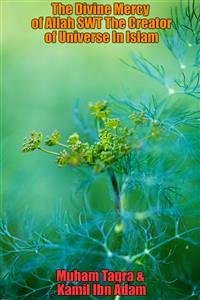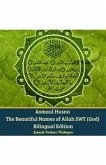If someone were to ask, ‘Who is your God?’ A Muslim response would be, ‘The Most-Merciful, the Dispenser of Mercy.’ According to Islamic sources, the prophets, while emphasizing God’s judgment, also proclaimed His mercy. In Muslim scripture, God introduces Himself as:"He is God, other than whom there is no deity, Knower of the unseen and the witnessed. He is the Most-Merciful, the Dispenser of Mercy." (Quran 59:22)In Islamic vocabulary ar-Rahman and al-Raheem are the personal names of the Living God. Both are derived from the noun rahmah, which signifies "mercy", "compassion", and "loving tenderness". Ar-Rahman describes God’s nature of being All-Merciful, while ar-Raheem describes His acts of mercy dispensed to His creation, a subtle difference, but one which shows His all encompassing mercy."Say, ‘Call upon God or call upon the Most-Merciful (ar-Rahman), whichever name you call – to Him belong the most Beautiful Names….’" (Quran 17:110)These two Names are some of the most frequently used Names of God in the Quran: ar-Rahman is used fifty seven times, while al-Raheem is used twice as much (a hundred and fourteen). One conveys a greater sense of loving-kindness, the Prophet said:"Indeed, God is Kind, and loves kindness. He grants with kindness what He does not grant with harshness." (Saheeh Muslim)Both are also divine attributes signifying God’s relationship with creation."Praise be to God, the Lord of All the Worlds; the Most Merciful, the Dispenser of Mercy." (Quran 1:2-3)In a prayer which Muslims recite at least seventeen times a day, they start with saying:"In the Name of God, the Most Merciful, the Dispenser of Mercy. Praise be to God, the Lord of All the Worlds; the Most Merciful, the Dispenser of Mercy." (Quran 1:1-3)These powerful words evoke a divine response:"When the servant says: ‘Praise be to God, the Lord of All the Worlds,’ I (God) say: ‘My servant has praised Me.’ When he says: ‘the Most Merciful, the Dispenser of Mercy,’ I (God) say: ‘My servant has extolled Me.’" (Saheeh Muslim)Divine mercy clasps in its arms the faithful and the faithless, the obedient and the rebel, but in the life to come it will be reserved for the faithful. Ar-Rahman is merciful to all creation in the world, but his mercy is reserved for the faithful in the life to come. Ar-Raheem will dispense His mercy to the faithful on Judgment Day:"…With My chastisement do I afflict whom I will - but My Mercy overspreads everything: and so I shall confer it on those who fear Me and spend in charity, and who believe in Our messages - those who shall follow the [last] Messenger, the unlettered Prophet whom they find described in the Torah that is with them, and in the Gospel…." (Quran 7:156-157)
Bitte wählen Sie Ihr Anliegen aus.
Rechnungen
Retourenschein anfordern
Bestellstatus
Storno









